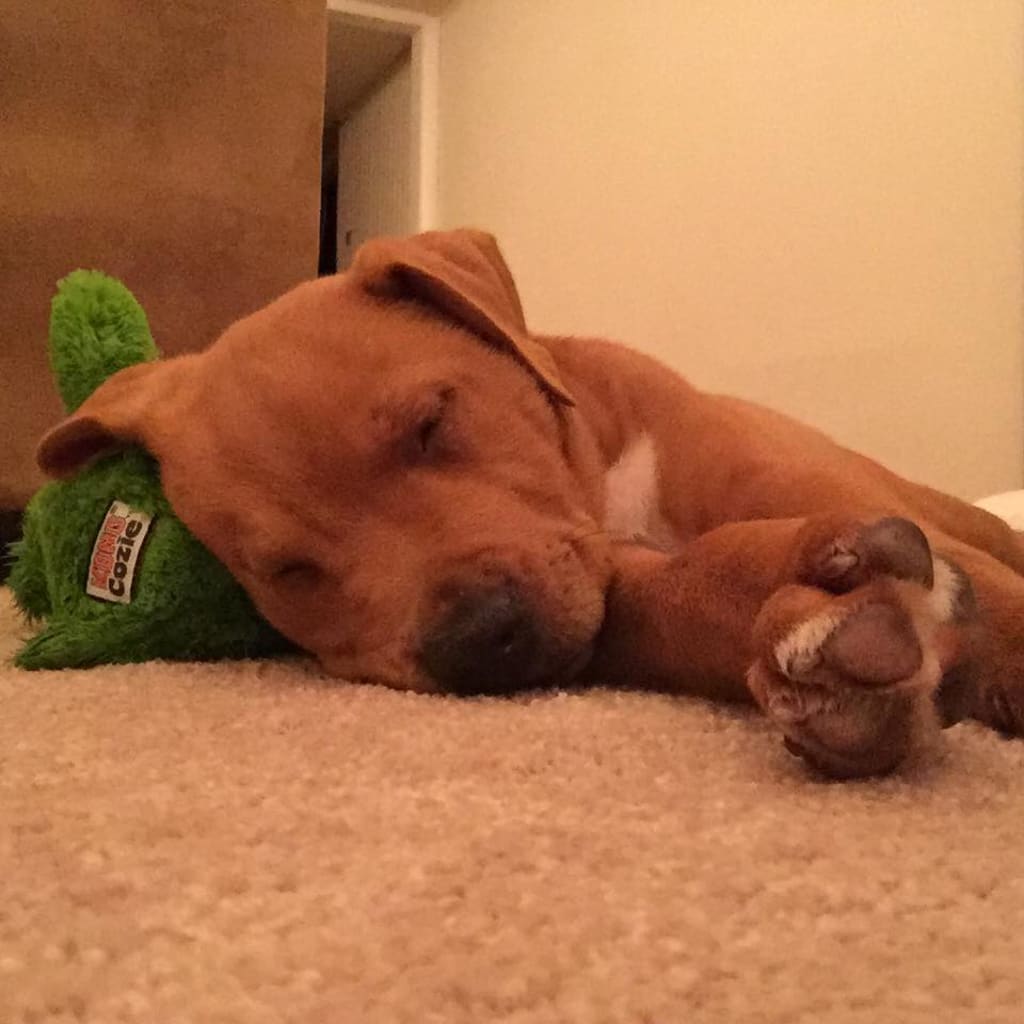Puppy Parent: What They Didn't Tell You About Bringing Home a Puppy
The Lessons and Experiences from a First-Time Puppy Parent

I'm going to share with you some lessons and experiences I've learned from being a first-time puppy parent.
Adoption Night
Raising a puppy is never easy. Movies make it look like a snap. The puppy makes a few messes, gets into trouble a few times, but eventually straightens out.
But the reality is far from what Hollywood paints as "picture-perfect puppyhood."
The reality of raising a puppy is daily messes, constant disobedience, consistent whining, and hyperactivity.
But don't worry, new puppy parents. It does get better.
My wife, Serena, and I adopted Kai, an American Pitbull Terrier, from a shelter in St. Louis in January 2017. Our intention was not to adopt that night, but things never quite work out as planned.
When we arrived at the shelter, we were greeted by three Pitbull puppies, all of whom were up for adoption. They quickly gravitated toward my wife as she sat on the floor, coating her in gentle licks as she giggled and gave me that "I-want-all-of- them-now" look.
As time passed, two of the puppies lost interest in her, but not our Kai. He plopped down in her lap and refused to leave.
Next thing I knew, my wife was holding our little pup in her lap as he shivered and shook in fear on the drive home. We did our best to comfort him, giving him praise and love and lots of petting.
Our decision, although made in haste, proved to be the right one. But we quickly learned how ill-prepared we were. We didn't even have dog food or a place for him to sleep that night.
So there I am, making a late-night run to Walmart for dog food and grabbing an old kennel from my dad's house, one that his dog had outgrown years ago.
We laid blankets down for Kai and watched as he explored his new home. He'd venture a few feet away from my wife and return to her just as quickly as he'd left her.
At this point, his four-month-old nose was going crazy, overloaded with new scents and smells. It wasn't much longer that he'd finally had enough and, on his own, walked into his kennel and went to sleep.
My wife and I thought we'd hit the jackpot. A puppy that doesn't whine and knows when to go to bed? This is going to be a snap.
We went to bed that night, naive and inexperienced, thinking we'd picked the perfect pup.
Oh, how wrong we were.
LESSON #1: No puppy is perfect, even if they seem to be mild-mannered their first few days at your home. That will change.
Potty Training
Kai's attitude and personality quickly began to show during the next few weeks. Once he was more comfortable around us and in our home, this "perfect" puppy became anything but.
Our first major obstacle was potty training. All pups need to be taught where it's acceptable to relieve themselves. And that can take a while. For us, it took Kai a few months to fully understand the words "potty" and "poop" (which is our command words when it's time to go outside).
But even when he understood the words, it took just as long for him to understand the concept behind them. He failed to realize that if he pooped in his kennel while we were at work, he'd have to sit in it all day.
My wife and I had to give him multiple baths a week because we'd come home to a fecal-matter-covered pup nearly every day. Although, I don't blame him. After all, it's extremely difficult for a pup to hold his bladder for eight hours a day in a kennel since it wasn't fully grown.
Kai was born on Halloween in 2016, and we adopted him in January 2017. He's almost one full year old now, and it wasn't until August that we'd been able to fully rely on him to not poop in his kennel while we were gone.
In other words, it took us eight months to get this potty training down to a science.
Lesson #2: Potty training is difficult and don't be discouraged if your pup doesn't master it quickly. They will. Sometimes, it's just a matter of age.
Rewards and Treats
Treats are an owner's best friend. They are a great way to get your pup to comply with almost any command.
But keep in mind. The only way to train a pup is consistency. Dogs are naturally intuitive. They can pick up on commands quickly when a reward is introduced.
For Kai, he mastered "sit, shake, lay down" faster than he was potty trained. To this day, all he has to do is see a treat and he goes through all three commands without me saying a word.
He knows if he does all three, he gets a treat. I use this to my advantage, adding additional steps now as part of his routine.
We are currently working on "stay," which for a hyperactive Pitbull puppy, is quite a daunting task. It's slow going, but he's starting to understand the word "stay" and that word connection to the action of "don't move."
Lesson #3: A trained dog is a happy dog. Dogs that know their boundaries and what they can and can't do can lead much more fulfilling lives. They are no longer worried about getting into trouble because they know where you've drawn the line.
Routine
Kai is on a very strict routine, one we've had him on since he was a puppy.
Every morning at 6 a.m., my wife takes him out to potty then back inside to eat breakfast. After he eats, it's back outside to poop, then he gets to wander the house (supervised) while she and I get ready for work.
Then, back to the kennel before we leave.
Fast forward eight hours later, I get home and take him out to relieve himself.
He'll pee, then it's time for dinner. After dinner, back outside to poop. Then we go for a walk to burn off the energy he's built up all day. After we've tired him out, we go through his commands.
"Sit, shake, lay down, stay."
If he completes all four, he gets a treat and is rewarded with love and affection (not to say that he's not already smothered with love and affection anyway).
Routines are extremely important and a great way to train your dog. If they know what to expect and when to expect it, that can make living with them that much easier.
Lesson #4: Tire your pup out. They'll listen and retain information much better if they can focus, which is usually possible after they've burned off all their energy.
Don't take your eyes off them.
Even when they know their boundaries, that doesn't stop most puppies from challenging them.
Kai knows not to take our socks (we've gone through at least two dozen since we brought him home), but that doesn't stop him from sneaking past us with a mouthful some days.
When you catch your pup doing something bad, be sure to let them know that that behavior is unacceptable.
When Kai breaks the rules, we say "bad boy" and put him in timeout. (Be sure their timeout area isn't the same area they sleep in to avoid confusion).
Lesson #5: At the end of the day, a dog is still an animal, no matter how well trained they are. They'll act like animals. Don't expect any more from them in that aspect.
Our Future with Kai
I won't lie. There have been times we've considered finding him another home. We've come home to disgusting messes, had our clothing torn apart, had bags chewed to pieces, and even our carpet destroyed (he was going through a digging phase).
But despite all that, he's a part of our family now. As he gets older, we can tell he's maturing in his behavior, and since we've already put in all the effort into training him and raising him, I want to reap the benefits from having a dog companion for life.
It's like depositing money into a bank account, only to have someone else withdraw the funds. I've put in my time and energy into building this account, I don't want someone else to tap it.
Lesson #6: Stick with it. Raising a pup is hard, but it's worth it.
About the Creator
Adam McDonald
I'm a simple man with an eclectic taste to life.
Enjoyed the story? Support the Creator.
Subscribe for free to receive all their stories in your feed. You could also pledge your support or give them a one-off tip, letting them know you appreciate their work.






Comments
There are no comments for this story
Be the first to respond and start the conversation.